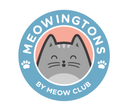There Are 5 Feline Personality Types - Which Is Your Cat?

Did you know that there are five feline personality types? According to a study in which researchers applied a model of human personality traits to pet cats, these feline purr-sonality types are dubbed “The Feline Five,” and include:
- Neurotic
- Extraverted
- Dominant
- Impulsive
- Agreeable
If you struggle with your cat’s behavioral problems or have a multi-cat household where certain cats don’t get along, understanding your cat's personality can help you understand why your cat is behaving in certain ways. It can help you form a game plan so you can make adjustments to the home or provide your cat with something they're missing, such as environmental enrichment - or something as simple as a place to hide.
Knowing the “normal” or baseline personality of our cats can also help us keep tabs on their health. A change in personality could indicate an underlying medical issue, like a normally outgoing feline suddenly growing withdrawn and hiding more often.
Let's take a look at how to recognize these personality types in your felines and how your cat can benefit!
1. Neuroticism (Skittishness)

Photo: Instagram
Cats with high scores in the "Neurotic" type are anxious or highly strung cats, displaying strongest levels of traits such as insecure, anxious, fearful of people, suspicious and shy. They're the cats that run for cover when visitors come over. They would rather hide than face the unknown!
The key to working with "Neurotic" cats is to give them plenty of opportunities to hide. Provide them with hideaways throughout the house, whether that is a cat tunnel, cat tree, or simply a cardboard box.
According to Dr. Pippa Elliott, these somewhat fearful felines cope with life by avoiding scary situations. But once they learn they are safe, they slowly begin to grow more confident.
2. Extraversion (Outgoingness)

Cats are generally seen as curious creatures, and cats that score high in the "Extroverted" category are even more so; "nosy" might also apply. These cats tend to need more mental stimulation and environmental enrichment. They can get bored easily and may resort to destructive behaviors to vent their pent-up energies.
The answer is to provide them with plenty of toys and spend time each day playing with them.
3. Dominant

Cats with Dominant personalities can make a multi-cat household frustrating and stressful. Dominant cats may hog household resources, such as food, toys, and even the litter box.
If you're struggling with a dominant cat bogarting all the goods, make sure each cat has their own food and water bowls, as well as multiple litter trays. Place these resources apart - the dominant cat can't be everywhere at once.
4. Impulsiveness

Impulsivity in cats isn't necessarily the same as it is in humans. A highly impulsive cat may be reacting to something stressful in their environment.
This type of cat may react differently to the same situation on different occasions. This is often a case of a cat who hasn’t quite learned to cope with life and, when faced with uncertainty, runs first and asks questions later. He may also have to manage a mix of high energy and anxiety.
Never shout at a spontaneous cat (or any other, for that matter) — it will raise his anxiety levels and increase his erratic behavior. It helps to have set routines, such as feedings and playtime, so he knows when something is about to happen — which prepares him to behave more appropriately.
5. Agreeableness

An Agreeable cat is exactly what it sounds like - the social butterfly of the bunch, who gets along with everyone and is never short of a friendly meow, a raised tail, and a happy headbutt. They are ideal cats for a multi-cat household. This agreeable personality is often the result of a cat who was well-socialized as a kitten.
According to the study, low scores for Agreeableness (a cat who might be irritable/aggressive towards people) could reflect "poor socialization, frustration, or underlying pain or illness."
Of course, every cat is unique and has its own blended personality, just as humans are. But being in tune with your cat’s personality can help you better meet your cat's needs on an individual level and provide them with the ultimate kitty paradise in your home.
If you're interested in taking a personality test for your cat, you can find the survey here!
Featured photo thanks to Rexiecat!

















Very brasen cat.
Can I have the name of the Author of this article so I can cite it in a research paper? Thank you.
https://bit.ly/3pqNrie – Sex without obligation
https://bit.ly/2I3ZL7m – Sex without obligation in your city
]
My sweet KatieKat jumped in my car at
McDonald’s and adopted me. She is the most loving and Affectionate cat I have ever been owned by
None of these really fit Trouble. He is so lazy it nearly bothers me because he won’t move when i need him to. He is VERY VERY good natured, though.
Leave a comment